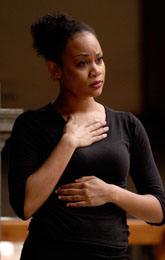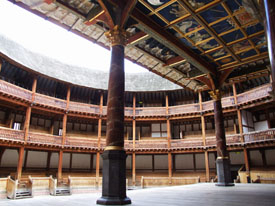Rutgers celebrates 10 years at Shakespeare’s Globe Theatre in London

Annapurna Sriram admits it: The thought of performing Shakespeare “terrified” her when she entered the Mason Gross School of the Arts.
“I’d done it in high school. You sit around in a classroom reading Julius Caesar,” the 2011 Theater graduate said. “You’re embarrassed. You’re fumbling over the words, and you’re not really sure what’s happening in a scene.”
But like many of her acting BFA predecessors, Sriram not only faced her fear, she embraced it during a year in London at Rutgers Conservatory at Shakespeare’s Globe.
Now in its 10th year, the Mason Gross School’s study-abroad program immerses all third-year acting undergraduates in classical Shakespearean training from dissecting iambic pentameter and mastering speech to mimicking period movement right in the Bard’s backyard on the re-imagined Globe Theatre stage.
“The Globe is the holy grail of acting – it’s where the modern tradition began,” said Dean George B. Stauffer, who implemented the program in 2003. “And the training at the Globe is superb: Our students study with the master teachers of this theatrical Mecca. The British approach to theater training is quite different than ours, and our students benefit tremendously from seeing their craft from another perspective.”
After a rigorous year crammed with classes, workshops, local plays and cultural outings, the program culminates with a student performance to a sold-out house—an experience that “approaches the sacred,” said Stauffer.
‘Revolutionary’
For Sriram the experience was life-altering. She left London smitten with Shakespeare — and she still is. In 2011 she played Hero in the Two River Theatre Company’s production of Much Ado About Nothing in Red Bank, N.J. In April, she takes to Berkeley Repertory Theatre’s stage in California for Pericles, Prince of Tyre at the behest of Mark Wing-Davey, an Obie Award-winning director and chair of New York University’s Graduate Acting Program.

“It’s kind of a big deal,” said Sriram, who added Wing-Davey’s selection speaks volumes about her alma mater. “He chose a Rutgers grad when he has so many NYU kids at his disposal.”
Sriram isn’t the first Mason Gross School acting student to approach Shakespeare with trepidation and leave the Globe transformed, said Barbara Marchant, who co-founded Rutgers Conservatory at Shakespeare’s Globe with Israel Hicks, the late chair and artistic director of the Mason Gross Theater Department.
“These students are working in the birthplace and workplace of Shakespeare, so it’s really alive for them,” said Marchant, also the vice chair of the Mason Gross Theater Department and head of its Acting program. “After coming to the Globe, they really understand it, and it’s in their very marrow. When a student can handle classical text with confidence, they can handle anything.”
Sriram likens her Globe training to a musician studying Bach or Mozart before rocking out to The Stones.
“If you’re able to master a technique in which you are speaking in a way that is unnatural to you but you’re able to do it naturally, filled with action, life and character, then when you approach TV pilots, even commercials – anything else you approach – you are that much better at breaking down the thought, breaking down the ideas, breaking the character and owning it,” she said.
Marchant calls the Globe program “revolutionary” because it has yet to be duplicated by another American or British conservatory. For that reason, she considers it the acting program’s “lynchpin.”
“Some schools will send students away for a semester,” she said. “No top conservatory will send their students away for an entire year because conservatory training is so specific.”
To foster such a program, Marchant worked to reconfigure the Mason Gross School’s entire acting curriculum to properly mesh the training students receive in American realism with classical British technique. That also included creating a no-nonsense course schedule for the students while overseas.
London bridge
Forget what you think you know about study-abroad programs, said Dalton Gray, 20, of Cornwall, N.Y., who is nearing the end of his London stay.
“[Other college students] have class from 9 a.m. to noon two or three times a week, and the rest of time they do a little work and they drink and they party,” he said. “We’re in class from 9 a.m. to 8:30 or 9 at night, six days a week. And the time we’re not in class, there’s so much work to be done that we might as well be in class. It is very different from study abroad, but it’s still very rewarding.”
A by-product of the intense program is personal growth, said David Esbjornson, chair of the Theater Department.
“Here in this rich and vital cultural center they will experience art, history and theater as an integral part of their everyday lives,” Esbjornson said. “The Shakespeare’s Globe program builds our students’ skills and at the same time broadens them as people. They always come back filled with new understanding and ready to renew their commitment to their work. This program, without a doubt, gives them a great advantage over other emerging artists.”
When she returns to the United States this spring, Danielle Blakeman, 21, of Greensboro, N.C., knows she will return as a more sophisticated, well-rounded individual.
“It is also exhilarating just to be in this city. You’re surrounded by creative minds and geniuses,” she said. “I feel like an inhabitant of London. I’m not afraid of new places, new cultures and new people because we completely immersed in the culture, which is one of the greatest life skills I could have asked for.”